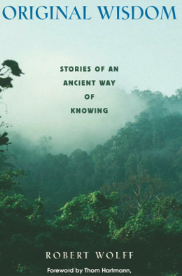Yes, that is what i too felt when I met and got to know Aborigines: coming home again after wandering in a strange and dangerous world for decades. I did not speak their language, but at least one person spoke some Malay (Malaysian, Indonesian). We communicated well enough with few words and many smiles and touch. After that first visit to a tiny settlement --three bamboo huts, less than a dozen people: women, men, children--I visited others when I could. Sometimes I went with someone, usually alone.
I learned from them how to live.
I learned what their reality was, the reality of being one with nature, being in the here and now. Really seeing, touching, all life around me, and knowing I am one with all life. A peace of the soul that western people cannot imagine any more.
The People, as they referred to themselves, of course, smiled almost all the time. They sang little songs as they wandered here and there, looking for food. They were nomads, as all aboriginal peoples were. They made dwellings from what they found in their immediate environment. Life had a rhythm that was the rhythm of the earth, and the jungle they lived in. They had no desire to change their world. Why should they? They had no rules, other than the laws of nature. No leaders, no laws, no police, no prisons. Oh yes, they knew what the modern world was like, but they wanted no part of it. They coveted no "things." Sometimes they had an old beat-up pan to cook in, some had a knife, or a machete. Clothes? Yes, some of them wore shreds that may have been pants at one time, but in the Tropics you don't need clothes to stay warm. And when you sleep in a huddle, a tight clump, you stay warm at night. The human body and its functions are no secret to anyone.
Yes, they were "poor" although when you don't use money what does that mean? They did not live as long as we do. But their gravest danger came from diseases they got from us. All over the world these last remnants of early Man have been pushed to the most inhospitable parts of our planet, the places we don't want. The snow and ice of the Arctic, the deserts of Africa, the jungles of the Amazon and a few parts of Asia, isolated islands in the Indian and Pacific Oceans we have no use for.
Westerners, civilized people, take one look and have a whole dictionary of words to explain primitive. From eradicate them, to let's give them religion, medicine, democracy and schools. Westerners talk power or compassion (sometimes in the same sentence).
But we, westerners, have forgotten what compassion is.
It is what I experienced when I grew up, and what I experienced from the aborigines. They accepted me as I am and I accepted them as they were. As I accept a tree: different, but I accept it for what it is. I don't see trees as lumber, or an element of a designed garden. I feel myself equal part of a wondrous whole. I don't like to use words like "love" because it has lost most of its meaning. But I experienced being loved unconditionally. Of course I knew and they knew that I was from another planet so to speak, but I saw them as and what they were. They saw me as a westerner, but a human. We were a "we." To me, that is what compassion means. To accept, to be with without being other.
-----------------------------
Of course my family and I returned to civilization, Hawai'i, where I had an even better "position" as universities call it. Hawai'i is beautiful, the people are mostly beautiful and mostly pleasant. My job was interesting, demanding. I made money, we lived very well indeed. My sons grew up with the ocean, surfing, sailing. A very healthy life.
And I could not get those Aborigines out of my head. Found the same kind of people on islands where the West had not (yet) put its stamp, and "wild" tribes here and there, I found the same ease of communication without words, the same intimate relation to their environment, the same joyfulness. And the same mutual respect, acceptance of who we were: different obviously, but equal in our humanity.
Next Page 1 | 2 | 3 | 4 | 5 | 6 | 7 | 8 | 9 | 10
(Note: You can view every article as one long page if you sign up as an Advocate Member, or higher).





